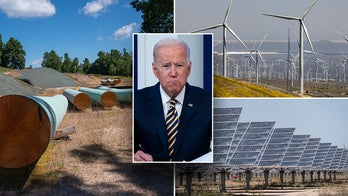Boehner: Obama faces referendum on economy
House speaker sounds off on intel leaks, dysfunction in Congress, the key issue in the presidential race and whom he favors as Romney's VP pick
Economic estimates reflecting a weak 1.5 percent growth rate in the second quarter quickly became a political football Friday, as Republicans used the stat to chastise President Obama over his economic policies and bolster warnings about "looming tax hikes" next year.
The Commerce Department reported Friday that the economy grew at the 1.5 percent rate from April to June, as Americans cut back sharply on spending. The rate matched expectations -- but expectations were low.
In a hastily convened conference call, the Mitt Romney campaign pointed to the figure as the latest sign the economy under Obama simply cannot produce enough growth to put millions of jobless Americans back to work.
"It's a picture of a decelerating economy," said Romney economic adviser Dean Glenn Hubbard. "At that pattern, the economy simply will never return to full employment."
A campaign email with a snapshot of the gloomy GDP headlines also poked at Obama's recent "you didn't build that" gaffe. The email was titled: "The Obama Economy: Barack Obama Built This."
While Republicans used the report as a campaign cudgel, the White House tried to look on the bright side -- in that, the economy is technically growing.
"Today's report shows that the economy posted its twelfth straight quarter of positive growth," Alan Krueger, chairman of the Council of Economic Advisers, said in a statement. "While the economy continues to move in the right direction, additional growth is needed to replace the jobs lost in the deep recession that began at the end of 2007."
Republicans seized on the Commerce report with an intensity usually reserved for the monthly employment reports, which often feature prominently on the campaign trail.
They also used the report to build their case for extending all the Bush-era tax rates before they expire at the end of the year.
"Today's GDP report is a troubling sign for the future of our economy, and it underscores the need to stop all of the looming tax hikes that will weaken it further," House Speaker John Boehner said.
Senate Democrats passed their version of the tax plan earlier this week, which calls for the rates to be extended for households making less than $250,000 a year, and rates to rise for those making more. Democrats, including President Obama, say top earners need to pay more to help close the deficit and stress that their plan would still benefit the overwhelming majority of taxpayers.
But Republicans warn that the limited tax hike would hurt small businesses, not just the wealthy.
The Commerce Department also said Friday that the economy grew a little better than previously thought in the January-March quarter. It raised its estimate to a 2 percent rate, up from 1.9 percent.
But growth at or below 2 percent isn't enough to lower the unemployment rate, which was 8.2 percent last month. And most economists don't expect growth to pick up much in the second half of the year. Europe's financial crisis and a looming budget crisis in the U.S. are expected to slow business investment further.
"The main take away from today's report, the specifics aside, is that the U.S. economy is barely growing," said Dan Greenhaus, chief economic strategist at BTIG LLC. "Along with a reduction in the actual amount of money companies were able to make, it's no wonder the unemployment rate cannot move lower."
Stock futures rose slightly after the report was released. Some economists had thought the growth estimate would be even lower.
The lackluster economy is raising pressure on Obama in his re-election fight with Romney, the presumptive Republican presidential nominee.
But few think the Fed, the White House or Congress can or will do anything soon that might rejuvenate the economy quickly. Many lawmakers, for example, refuse to increase federal spending in light of historically large budget deficits.
Many economists, however, believe the Fed will launch another round of bond buying at its September policy meeting. The aim is to drive long-term interest rates lower and encourage more borrowing and spending.
The 1.5 percent growth rate in the second quarter was the weakest since the economy, as measured by the gross domestic product, expanded at a 1.3 percent rate in the July-September quarter last year. GDP measures the country's total output of goods and services, from the purchase of a cup of coffee to the sale of fighter jets.
Current-dollar GDP increased at an annual rate of $117.6 billion in the second quarter to $15.6 trillion.
Growth was weaker mostly because consumer spending slowed to a growth rate of just 1.5 percent. That's down from 2.4 percent in the first quarter. Americans bought fewer autos, computers and other long-lasting manufactured goods. Spending on services increased.
They also saved more. The savings rate increased to 4 percent, up from 3.6 percent in the first quarter.
Consumer spending, which accounts for 70 percent of economic activity, was offset somewhat by a slightly smaller drag from the government. Spending by governments fell at an annual rate of 1.4 percent in the second quarter, just half of the 3 percent rate of decline in the first quarter.
The Commerce Department also revised its growth estimates for the past three years. Those revisions showed that the economy contracted 3.1 percent in 2009, slightly less than the 3.5 percent previously reported. Growth in 2010 was put at 2.4 percent, down from 3 percent, with growth in 2011 at 1.8 percent instead of 1.7 percent.
The U.S. economy has never been so sluggish this long into a recovery. The Great Recession officially ended in June 2009.
Until a few weeks ago, many economists had been predicting that growth would accelerate in the final six months of the year. They pointed to gains in manufacturing, home and auto sales and lower gas prices.
But threats to the U.S. economy have left consumers too anxious to spend freely. Jobs are tight. Pay isn't keeping up with inflation. Retail sales fell in June for a third straight month. Manufacturing has weakened in most areas of the country.
Fear is also growing that the economy will fall off a "fiscal cliff" at year's end. That's when tax increases and deep spending cuts will take effect unless Congress reaches a budget agreement.
All that is making companies reluctant to expand and hire much.
The Associated Press contributed to this report.





